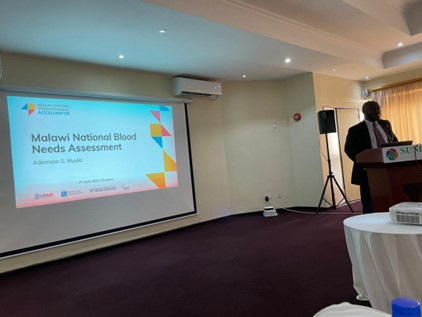Home » Strengthening Blood Systems in Malawi: Driving Sustainable Improvements Through Better Coordination, Sustainable Financing, and Evidence-Based Change Management

Reva Alperson
Senior Program Associate, Results for Development

Adeel Ishtiaq
Program Director, Results for Development
Safe blood systems are vital for treating various health issues such as malaria, HIV/AIDS, hepatitis, road traffic accidents, postpartum hemorrhage (PPH), or excessive bleeding after childbirth. PPH is a leading cause of maternal deaths globally, and in Malawi, it contributes to the country’s high maternal mortality rate at 381 per 100,000 live births in 2020. Although Malawi has improved its blood supply, significant obstacles remain. These include weak coordination among disparate blood system stakeholders, outdated and unreliable methods for estimating blood demand, inadequate and unsustainable funding, and lack of consistent data on blood usage and management in healthcare facilities. From 2021 and 2023, approximately 25% of hospital blood requests were unmet, highlighting the system’s deficiencies.
To address these issues, Results for Development (R4D) is partnering with the Malawi Blood Transfusion Service (MBTS), which oversees the national blood system, as part of the USAID Health Systems Strengthening Accelerator program (Accelerator). This partnership, which began in 2023, has initiated a series of technical support activities to make long-term enhancements to Malawi’s blood services. These services are expected to be completed by summer 2024 and provide valuable insights for other low- and middle-income countries (LMICs) looking to improve their blood systems.
Enhancing Collaboration in Malawi’s Blood System through a Multisectoral Steering Committee
ne challenge in Malawi’s blood system stems from the distant relationship between the MBTS and the broader health sector. Although MBTS operates semi-autonomously under the Ministry of Health, which allows its flexibility in managing its operations, this setup also hinders its ability to effectively integrate with broader health programming, such as routine data collection, health system funding, and health worker training and development. To overcome these challenges, the Accelerator helped MBTS to establish a Steering Committee for Technical Assistance to the MBTS on Blood System Strengthening. This committee includes representatives from various Ministry of Health departments/directorates, the World Health Organization (WHO), professional associations, non-governmental organizations, and health facilities. It aims to foster collaboration and engagement among these entities, many of which operate independently. MBTS regularly convenes this committee to share updates on technical assistance activities, gather feedback, and enhance coordination.
Building an Advanced Model to Optimize National Blood Supply Estimate in Malawi
One of the major challenges the MBTS faces is the absence of current, evidence-based data on the need for blood. This data is crucial for benchmarking performance, setting targets for blood collection, and effectively allocating resources. Through a team of expert consultants from the Kamuzu University of Health Sciences, the Accelerator is developing an evidence-based statistical model—to be owned and operated by the MBTS—to forecast the national demand for blood and blood products accurately. This forward-looking model will incorporate evolving data on disease burden, demographic changes, and actual blood usage in facilities, enabling more precise planning and resource allocation. Additionally, the Accelerator will train MBTS staff to ensure they can effectively use and maintain the model regularly.

Strengthening Financial Stability in Malawi’s Blood Services Through Enhances Funding Coordination
As donor support diminishes, MBTS is shifting towards a cost recovery model—charging health facilities for each unit of blood and blood products supplied—as their primary source of revenue. Unfortunately, this system has led to delays and shortfalls in payments and accumulating debts, threatening MBTS’s financial viability. A key issue is the inadequate blood budget by central hospitals and local governments, who often fail to allocate sufficient funds based on historical usage and may divert these funds to other needs like medications. The Accelerator and the MBTS are establishing a multi-stakeholder task force to improve the coordination of financial contributors to Malawi’s blood system. Through a soon-to-be institutionalized process, task force members will ensure that funding allocations are accurate, based on blood demands estimated by the newly developed model, and that these funds are specifically earmarked and promptly disbursed to the MBTS. The task force will include representatives from the MBTS, the MOH Department of Planning and Policy Development (which stewards budgeting policy), the MOH Department of Health Technical Support Services (which oversees MBTS), the Ministry of Finance, central hospitals, National Local Government Finance Committee (NLGFC), and the secretariat of the Christian Health Association of Malawi, which coordinates policy matters on behalf of faith-based hospitals, among other actors. This collaborative effort is designed to stabilize and secure funding for Malawi’s critical blood services.

Additionally, the Accelerator is conducting a landscape analysis of cost recovery approaches for blood to identify key success factors and limitations, contextualize them for use in Malawi, and produce strategic recommendations for MBTS consideration.
Piloting Standardized Blood Data Collection Mechanisms for Future Scale-up
A robust blood transfusion system should generate routine data for performance monitoring and quality improvement across the blood cycle, from collection to transfusion. Currently, the MBTS lacks access to detailed facility-level data on blood transfusions, and the data collected is often non-standardized and incomplete. Crucial information, such as clinical outcomes and the specific health conditions requiring transfusions, is missing.
This lack of visibility for the MBTS into blood use and management at facilities hinders resource planning, performance monitoring, and general oversight over the blood system. With the support of Valiant Impact Limited, a local partner organization in Malawi, the Accelerator and MBTS are developing and piloting standardized tools and processes for blood data collection and reporting at Queen Elizabeth Central Hospital (QECH) in Blantyre, Malawi. This pilot includes a baseline assessment of blood data collection practices and needs for support, capacity building for health workers at QECH, ongoing mentorship support with data collection and analysis, and integration of blood indicators within Malawi’s existing health information system. Final learnings will be disseminated to support a nationwide roadmap for scaling up blood data collection in health facilities.
What’s Next for Blood System Strengthening?
While the current collaborative efforts between the Accelerator and the Malawi Blood Transfusion Service (MBTS) are nearing completion, they have laid the groundwork for sustainable, locally-driven advancements in Malawi’s blood system. However, significant challenges must be addressed to enhance the system further. These include improved training for healthcare workers, better supply chain management for critical blood-related commodities such as blood bags and laboratory supplies, and enhanced community-level blood collection efforts.
An efficient and safe blood system can dramatically improve health outcomes across various areas, including maternal health, road safety, HIV/AIDS, cancer, and more. This need for strengthening blood systems is not unique to Malawi but is a common challenge across many low- and middle-income countries (LMICs). Therefore, there is a pressing need for increased global technical support in this field. International health partners must prioritize and support the development of integrated, sustainably funded national blood systems. Ensuring access to safe blood is crucial for protecting global public health, and fostering robust blood systems in LMICs is essential for achieving health equity worldwide.
Further Reading
- WHO Blood System Self-Assessment Tool
- An Investment Case to Strengthen the National Safe Blood System in Malawi (available through USAID Global Health Bureau and the Boston Consulting Group)
- Safe Blood for Maternal Health at R4D
- Safe Blood Systems Combat Postpartum Hemorrhage and Improve Maternal Survival
- Perspective: Building Liberia’s Blood System is a Journey of Collaboration and Advocacy




